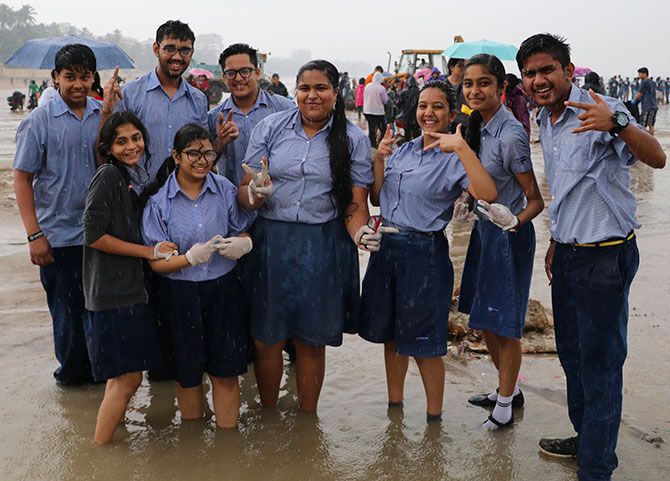After bidding farewell to Lord Ganesha, Mumbaities came forward to help the civic authorities for beach cleanup. Rediff.com's Hitesh Harisinghani speaks to the volunteers involved in the clean-up.

Mumbaities once again proved their love for the city when school kids, college students, professionals from different walks of life turned up on a rainy day to clean up Juhu beach after Ganpati Visarjan.
“Why shouldn’t we keep the beach clean? It’s our duty right,” claims Tanya Bansal, a 12th grade student from RN Podar school in Santacruz.
“We are ones to dirty it so it’s our responsibility to clean it as well. If we can’t clean something why dirty it in the first place.

“I believe people should use eco-friendly Ganesha idols or the ones made from chocolate which cause less harm to our environment. This is of no use and is just waste of money”, says the 12th grader and get back to cleaning.
Shree Agnihotri, a lawyer working for Free a Billion, a non-profit organization that aims to create empowered city governments with greater citizen participation to make city lives better.
Approximately hundred of their volunteers from various organisations and colleges have been cleaning the beach from 6 am.

“Festivals get people together and that is how Ganesha festival was started by Bal Gangadhar Tilak. It had a political undertone and I think it still does. That’s how I view it. But I’m happy to see so many people who are concerned about the nature. This definitely gives hope for a better future,” said Agnihotri.
When asked if plaster of Paris should be banned, Shree said, “If we ban POP there’s likelihood that people will still keep using it because you can never have a law that can implement such a ban. So what is needed is that people should be made aware about the consequences of using it and giving them alternate solutions.”











 © 2025
© 2025